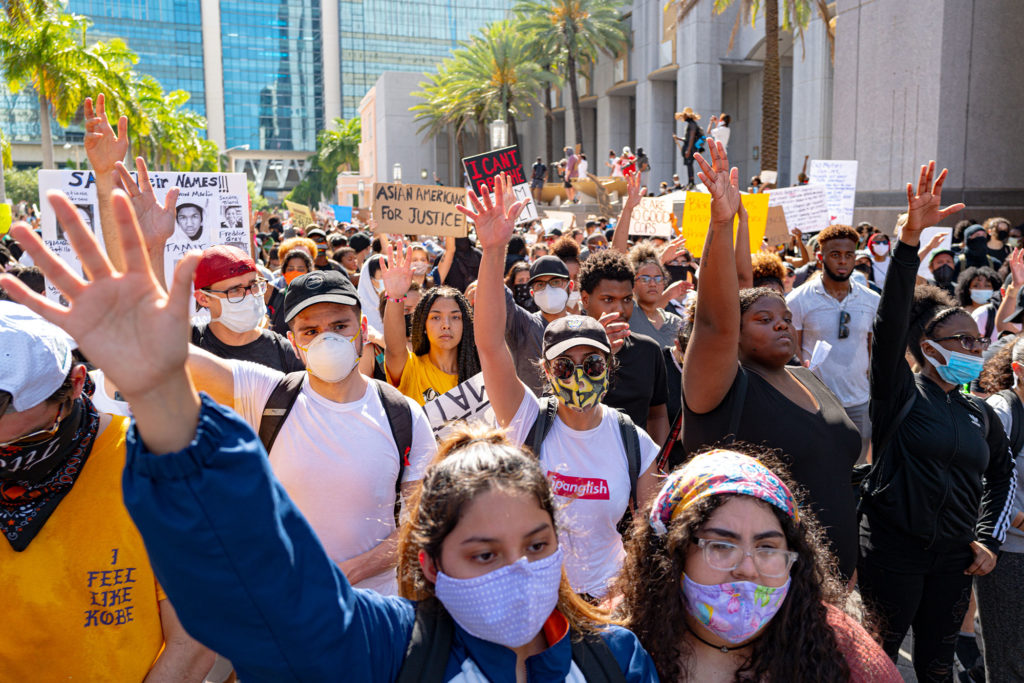 Some of you may be weary from a week of protesting, from braving the pandemic to express your pain and outrage. We have seen the grizzly image of an innocent man, handcuffed and lying prone to the ground, killed as if his life had no meaning. As if he weren’t the father of a 6-year-old girl, the brother of siblings who learned about life with him by their side, the son of a woman he called out for in his last moments of life.
Some of you may be weary from a week of protesting, from braving the pandemic to express your pain and outrage. We have seen the grizzly image of an innocent man, handcuffed and lying prone to the ground, killed as if his life had no meaning. As if he weren’t the father of a 6-year-old girl, the brother of siblings who learned about life with him by their side, the son of a woman he called out for in his last moments of life.
The brutality of George Floyd’s death may have traumatized you, especially if you are a person of color. If so, you know all too well the systemic racism and history of white supremacy that lead to this most recent catastrophe. If you are white, and have grappled with the cruelty baked into our racist societal structures, you probably also feel acute pain but it may not reach the level of trauma our brothers and sisters of color are now coping with.
As a clinician, I have learned about trauma and its ripple effects that can inform the course of a person’s life. A central part of trauma is feeling unseen. As if the trauma didn’t occur or wasn’t so bad. We humans are remarkably capable of recovering even from the most shocking events. But when our pain is minimized or denied by others, we are left radically alone and at times doubting the gravity of our own experience. For this reason, trauma survivors are often saddled with chronic feelings of fraudulence or insufficiency. They question themselves in ways that can generate acute suffering long after the trauma occurs.
The trauma of racism can have similar results. In part, this is why the protests have been so critically important. They are a way to confirm to each individual and to those bearing witness that the brutal results of white supremacy are unacceptable. They are a reliable reflection of unbearable pain, too much collective loss, and the hunger for societal healing.
If you are a white ally during this time of needed civil unrest, I humbly suggest that one way of challenging racism is to stay tuned to the inner life of your friends and family of color with deep curiosity and the willingness to learn. To be present without the pitfalls of white saviorism or self-referential virtue, and listen to the emotional complexity that is in dire need of a compassionate, attuned, and humble response.
Our racist society has dehumanized people of color by implying that they lack inner life, a full and complex psyche replete with longing, feelings of every kind, unclaimed capacities and gifts, depths of love and compassion. To be an ally at this time of civil unrest and during this pandemic seems to be a call for humble determination and respectful curiosity.
I am heartened to see the millennials out in droves…and wearing their masks! Perhaps they are stepping in for us older folks who can’t risk walking among our brothers and sisters at this time even though we long to. They are using their voices to be heard, to speak for George Floyd in his time of anguished loss, to convey to our woeful leadership that dominance is a denial of our humanity. Domination is not an answer to the human condition. It is the ultimate dodge of our vulnerability, the very tenderness that makes us all equally human.
To the family of George Floyd, I am sending you metta. To the millennials, I am sending you my gratitude. To the extended human family, I send my compassion for navigating this moment in time with all its treacherous pitfalls alongside its enormous potential for healing. May it come swiftly.